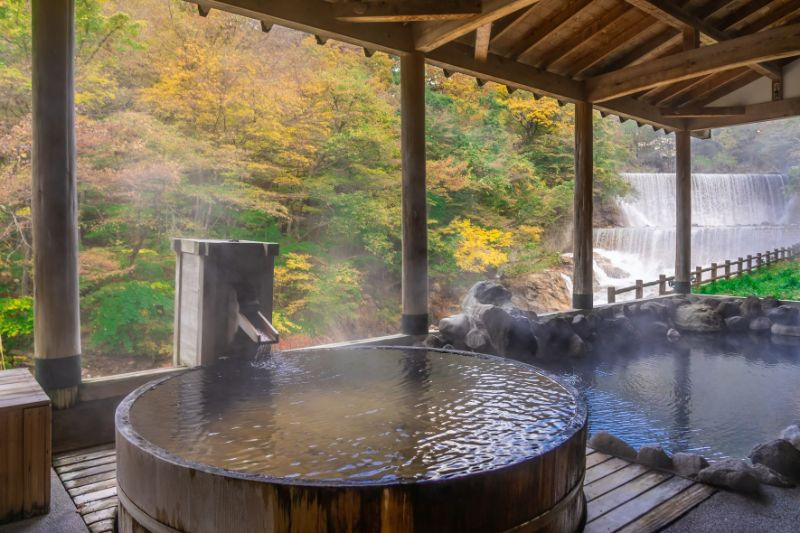Beyond the Cherry Blossoms: Venture to Japan's most secluded hot springs and Onsen Towns
- Jun 27, 2025
- 3 min read
Updated: Jul 13, 2025

Japan is famous for its delicate cherry blossoms, bustling Tokyo streets, or the serene beauty of Kyoto's temples spring to mind. And while these iconic sights are undoubtedly enchanting, there's another, equally profound, and incredibly soothing side of Japan often overlooked by first-time visitors: its traditional onsen towns.
Beyond the fleeting beauty of the blossoms lies a deep-rooted culture of wellness and relaxation, centered around Japan's abundant natural hot springs. To truly experience the heart of Japanese hospitality and tranquility, you need to trade the city's pulse for the steam rising from ancient baths, the quiet charm of a wooden ryokan, and the gentle pace of life in a hidden onsen village.
The Allure of the Onsen Tradition
For centuries, onsen (hot springs) have been an integral part of Japanese life, revered not just for their therapeutic mineral properties but as places of purification, community, and peace. Staying in an onsen town means more than just a quick dip; it’s an immersive experience.
You'll don a yukata (a lightweight kimono), stroll through charming streets, perhaps visit local temples, and indulge in exquisite kaiseki (multi-course) meals prepared with seasonal, local ingredients, all culminating in the blissful relaxation of the communal baths. While popular spots like Hakone and Beppu draw crowds, Japan is dotted with countless smaller, more traditional onsen villages that offer a deeper, more authentic plunge into this cherished custom.
Traditional Onsen Towns: Hidden Hot Springs to Seek Out
Nyuto Onsen Village (Akita Prefecture)
Tucked away in the Towada-Hachimantai National Park, Nyuto Onsen is not just one onsen, but a collection of seven rustic ryokans, each with its own unique hot spring source and distinct milky-blue or clear waters. Tsurunoyu Onsen, the oldest and most famous, offers a truly traditional, rustic experience with its iconic outdoor mixed bath. Getting here feels like a journey back in time, promising deep relaxation amidst untouched nature.

Kurokawa Onsen (Kumamoto Prefecture, Kyushu)
Nestled in a forested valley, Kurokawa is famed for its beautifully preserved traditional atmosphere. Rather than individual large resorts, the town emphasizes smaller, intimate ryokans and a charming "Onsen Hopping Pass" that allows visitors to try three different baths from various establishments. Stroll along the Kawa River, cross quaint bridges, and discover the unique outdoor baths (rotenburo) carved into the landscape.
Ginzan Onsen (Yamagata Prefecture)
Stepping into Ginzan Onsen is like walking onto a set from a Studio Ghibli film or a scene from the Taisho-era. Famous for its beautifully preserved wooden ryokans lining a narrow river, illuminated by gas lamps in the evening, it's particularly magical in winter when snow blankets the rooftops. It's a picturesque escape that perfectly blends historical charm with the warmth of its springs.

Shibu Onsen (Nagano Prefecture)
While often associated with the nearby Snow Monkey Park, Shibu Onsen itself is a delightful, traditional village with nine public bathhouses, each believed to cure different ailments. Guests staying at a local ryokan receive a key to explore these charming, authentic baths. The town's narrow streets, lined with wooden inns, evoke a nostalgic atmosphere.
Tsuboyu Onsen (Wakayama Prefecture)
Located within the sacred Kumano Kodo pilgrimage routes, Tsuboyu is unique: it's the only onsen in Japan where you can bathe in a public bath registered as a World Heritage site. This tiny, rustic, rock-carved bath, big enough for just a few people, offers an incredibly intimate and historic bathing experience. Its water is said to change color seven times throughout the day!
Final Thoughts
To truly appreciate the depth of Japan's culture, look beyond the well-trodden paths. A journey to a traditional onsen town offers a rare glimpse into a timeless way of life, where hospitality is paramount, nature's healing powers are revered, and moments of quiet contemplation are cherished.
.png)


